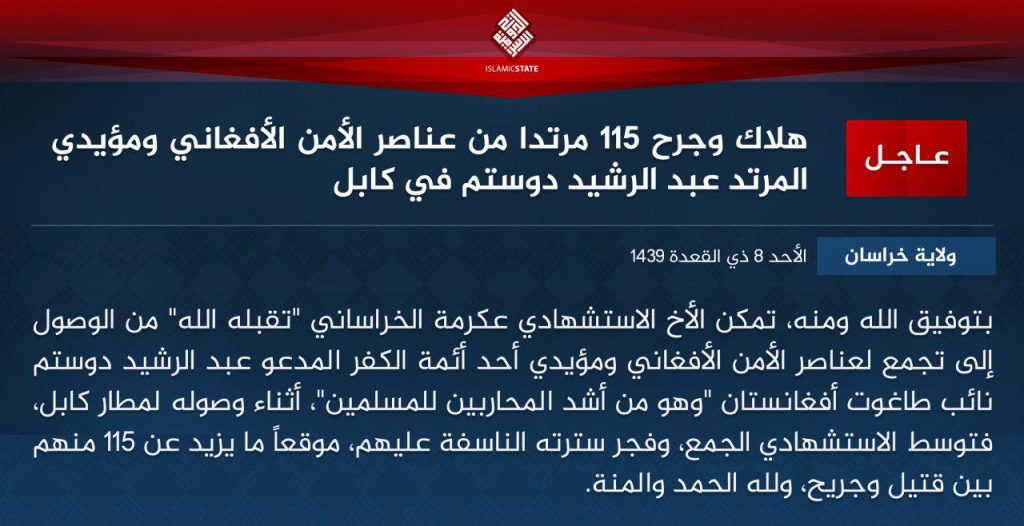
A suicide bomber struck just outside the Hamid Karzai International Airport in Kabul earlier today. The jihadist detonated his explosive just minutes after Gen. Abdul Rashid Dostum, Afghanistan’s first vice president, passed through the area. Dostum is a controversial figure who has been accused of various crimes throughout his career.
The bombing was claimed by the Islamic State, which issued three short statements via its Amaq News Agency and then a longer message. The jihadists claim that 115 people were killed or injured in the explosion. The death toll from the attack has climbed throughout the day, with press reports indicating that at least 14 people were killed and dozens more wounded.
The Islamic State says that Dostum, who spent more than a year in exile in Turkey, is an apostate. In its second message on the bombing, the group highlighted the fact that its bomber had come close to the “ceremony” celebrating Dostum’s return to Afghanistan. In its third and longest claim of responsibility, the jihadists identify the bomber as ‘Ikramah al-Khorasani, saying that he “managed to reach a crowd of Afghan security personnel and supporters of one of the heads of kufr,” Dostum, who is “one of the most severe warmongers against the Muslims.” Al-Khorasani detonated his “explosive vest” in the middle of the “gathering.”
The so-called caliphate’s Wilayah Khorasan (or Khorasan “province”) has conducted a string of suicide bombings and other operations in the Afghan capital this year.
In a report released earlier this month, the United Nations Assistance Mission in Afghanistan (UNAMA) that civilian casualties due to “suicide and complex attacks” had risen during the first six months of 2018, as compared to the same period last year. UNAMA recorded “1,413 civilian casualties (427 deaths and 986 injured)” caused by “suicide and complex attacks” from January to June 2018. This is “257 more casualties from 12 more attacks than the same period in
2017.”
More than half (52 per cent) of these casualties were attributed to the Islamic State’s Wilayah Khorasan, with 40 per cent caused by the Taliban, and “the remainder” attributed “to unidentified Anti-Government Elements.”
“Suicide and complex attacks” have also accounted for a disproportionate number of casualties in Kabul province this year. According to UNAMA, “95 per cent of all civilian casualties” in Kabul province during the first six month of 2018 “were caused by suicide and complex attacks, with more than half caused by suicide and complex attacks claimed by” the Islamic State’s Wilayah Khorasan.
UNAMA’s data confirms that Abu Bakr al-Baghdadi’s representatives in Afghanistan regularly conduct lethal attacks in the Afghan capital, in spite of an intense, US-led counterterrorism campaign against the group. The US and its allies have dislodged the jihadists from some of the ground they once controlled in eastern Afghanistan, but they continue to operate in several areas of the country.
And the Islamic State branch deliberately targets the Afghan government and its allies.
Twice in recent weeks (June 11 and July 15) the group dispatched suicide bombers to the Afghan Ministry of Rural Rehabilitation and Development building in Kabul.
On June 4, an Islamic State suicide bomber struck a gathering of the Afghan Ulema Council (AUC) in Kabul just after the body had ruled “martyrdom” operations to be religiously forbidden. Obviously, Baghdadi’s men ignore their ruling. The AUC is aligned with the Afghan government, and its edicts are intended to undermine support for the Taliban and like-minded extremists.
On May 30, a 10-man (or adolescent) team of jihadis assaulted the offices of Afghanistan’s interior ministry in the capital.
These are just some of the attacks launched by the Islamic State in Kabul this year. The Taliban also operates inside the city, launching its own operations against the government and others.
from Long War Journal – FDD's Long War Journal https://ift.tt/2LJuuDi
via Defense News
No comments: